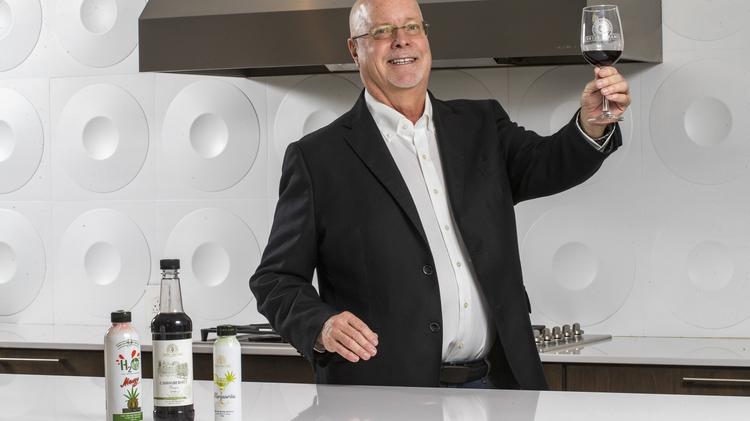Bill Gibbs, former president of University of Phoenix, is getting into the cannabis business in a unique way.
He was awarded a medical marijuana dispensary license in 2012. By 2019, he sold the license to Tempe-based Harvest Health and Recreation Inc.
“The multiples were too great,” he said. “I was like, I’ve got to sell.”
About six months went by when he started thinking about creating a cannabis drink as a healthier alternative to alcohol — avoiding the hangover. Earlier this year, he founded Sweet Dreams Vineyard to sell his liquid concoction to cannabis dispensaries.
Why a cannabis drink instead of edibles? And did you create the formula for the drink? With regular cannabis oil, the body has to produce a series of chemicals and enzymes that act as an emulsifier to allow the cannabis oil to be digested and absorbed by the small intestine. This process can take multiple hours. As a result, after the first hour, the consumer doesn’t feel any effect and so they take more. Ninety minutes later, they still don’t think it’s working, so they take even more. Maybe they take even more after that. When it finally does kick in, their feet don’t touch the ground and they will have had a terrible experience. I did create the formulas, along with the help of a local sommelier. I purchased every type of juice known to man and then we started combining various ingredients, kept tasting and passing out samples until we had a flavor profile that people thought was great.
How many cannabis dispensaries have bought the product? Sales are going good in 15 dispensaries right now. The holidays are always good months for the cannabis industry. The theory is people have to deal with families. It’s an alternative to bringing a bottle of wine to the family dinner.
Do you sell in other states? The 15 dispensaries are only in Arizona. I’ve had interest from other states. They’re trying to give me money to go to those states. I don’t have it dialed in. The last thing you want to do is be in 100 locations and have some issue come up and you can’t figure it out yet. I’m in no hurry.
What’s your competition like for cannabis drinks? There aren’t many. It’s a tiny market. Edibles are 5% of the cannabis market. Drinks are 5% of the edibles market. Although the market is very tiny right now, we’re leading our aim to shoot at a more significant market when it appears. So far, none of the local Arizona distributors or purveyors seem to have cannabis drinks on their radar. When the market heats up, we may have to partner with one of these Arizona distributors. However, for now, we are getting prepared with products that the consumers want, that work like alcohol, are healthier, and don’t have some of the negative consequences of alcohol. When that time comes, I hope to be ready to become one of those $100 million smaller companies.
What are your projections for 2022 annual revenue? It’s small. Less than $1 million. Arizona is small compared to the rest of the U.S. The trick is to be dialed in to go out to the rest of the U.S. You can’t ship across state lines. The nice part is there are going to be certain barriers to entry for large companies to come in. I’ve already got a half a dozen states I’m talking to. You only get one shot. You don’t want to blow that.
What lessons did you learn at UOP that will help you in this sector? They are both emerging markets. UOP was the first for-profit higher education institution accredited by North Central Association of Colleges and Schools. That was all John Sperling, the founder. When North Central would come out, they wanted to close us down. Credit to him. He had students take a comprehensive knowledge exam before the class and take the same exam after to show the difference. Tell us any other school that can do that. Finally, they gave in.
Why did you join UOP? I had been at PricewaterhouseCoopers in my early 20s and John Sperling came to me because he wanted to file bankruptcy. He had been in business for 10 years or something. When he told me he had the first and only for-profit institution of higher education approved by North Central, he made me an offer I couldn’t refuse. I went to the banks to get a loan to keep the company afloat. I was chief of finance, then president running things. Thirteen years later he said let’s take the company public. I had a close relationship with him.
Then what happened? I became a stay-at-home dad. I couldn’t afford to work. Currency wasn’t money. Currency was time. I didn’t want the kids to grow up while i was working late hours. I became their soccer coach. I played soccer at Arizona State University.
H/T: www.bizjournals.com



